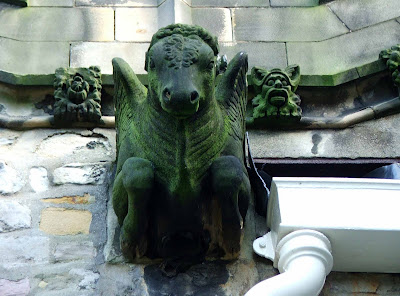Gargoyles at Holy Trinty Church
Kendal
Cumbria
Gargoyles are a common enough sight at many churches, but the number and variety of these otherworldy creatures, carved in stone and peering at you from the walls of the Parish church in Kendal makes this building special. Most of the multitude of gargoyles are of Victorian 'invention', with beasts of all kinds to look for. Gargoyles were usually designed to hide spouts that took water away from the roof and drains of a building. The word Gargoyle is derived from the French word gargouille, meaning throat or gullet, a passage down which water could travel. Many gargoyles, and this is true of those at Holy Trinity in Kendal, are no longer used to hid water spouts, but are just for decoration. Gargoyles were also used to frighten off evil spirits, and it's easy to see why this was the case. Shown below is a selection of the gargoyles that can be seen on the external walls of the church.
Above. Two serpent headed, winged creatures battle it out, high up on the church wall.
Above. A strange winged 'cow' like creature stares out from the wall. A small green man can be seen to its right.
Above. A gryphon type creature holds its tail in its jaws.
Above. A demon looks out from the church walls. This is one of the largest gargoyles at Holy Trinity.
Above. A tiny green man.
Above. A laughing 'cat' like gargoyle.
Above. One of the larger gargoyles guards the corner of the church.
Above. A squirrel. With those teeth?
Above. His partner in crime.
This is where the squirrels live...above a niche in the East wall.
Above. Another view of one of the larger gargoyles guarding the corner of the building.
Above. Is this a laughing pig?
Above. A view of one of the corners of the church. Gargloyles look out in all directions.
Above. A hooded man.
Above. A larger gargoyle on the corner of the church, seems to defy gravity.
Above. This gargoyle looks out over the grave yard at the East of the church.
Above. A strange winged bull.
Above. A tiny elf like gargoyle. Note his pointed ears. A Vulcan perhaps?


















1 comment:
Great images but think the mean Vulcan? ( Vulvan = Vulva??)
Post a Comment